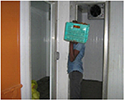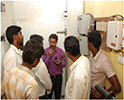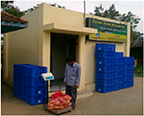

Mini Cold Storage Units Project
The post harvest wastage of vegetables, in India, account nearly for Rs. 60,000 crores annually, cutting into the thin
earnings of small farmers. Large cold storage facilities are out of reach and unsuitable for the small farmers. The yawning
gap in the vegetable cold storage chain, between large cold storage units and the domestic refrigerators, leaves no options
for appropriate storage at farmers' markets, where vegetables lose their value adversely. Ironically, the small vegetable
farmers are also the weakest link of the wealth chain.
Technology flow is constrained due to lack of resources and vice
versa. Overcoming this vicious circle of market failure is the aim of this World Bank Development MarketPlace supported
project intervention successfully implemented by the Tiruchirappalli Regional Engineering College- Science and Technology
Entrepreneurs Park TREC-STEP.
Vegetables, when out of cold storage, lose their price in the daily markets and also quickly get rotten.
So, the small farmers lose any where between 20 to 30%, since cold storage facility is not available to maintain
freshness and to slowdown the rotting process. This loss is fully borne by small farmers. It is estimated that at least
10% of the loss in the value of the vegetables, occur in the vegetable market place. Bringing down this wastage by 50%
would be possible by introducing custom built Mini Cold Stores.
These Mini Cold Store units are designed to provide a
very innovative technology solution, to address the different temperature, space, handling and humidity requirements, of
various vegetables. However, the efficient use of the facilities goes beyond this technology solution and also demands a
new innovative social architecture, in a public-private-partnership mode.
Developing these new Cold Store services as
micro entrepreneurial ventures, by technology and business trained rural youth, can ensure sustainability of the
initiative.
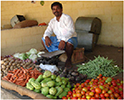
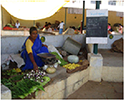
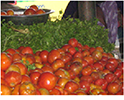
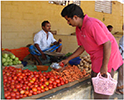
Project Actions and Results
Under this Development MarketPlace supported project, TREC-STEP has designed and installed custom made innovative Mini Cold Storage units at 5 farmers markets (Karur, Kumbakonam, Salem, Nanganallur and Palayamkottai) in the state of Tamilnadu, to suit the requirements of the small farmers. These Mini cold storage units are designed as sharable common facilities which are useful to the small farmers and to restore few dollars more to their hands.
Earlier, to understand the small farmer's requirements, TREC-STEP had conducted a series of structured surveys, interviews and interactions with farming communities, government personnel, technologists, market managers and other interest groups. TREC-STEP has also deployed an expert technology group to analyze and understand the problem and field requirements of farmers markets.
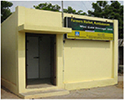
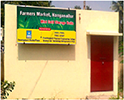
To suit the seasonal conditions and vegetable storage requirements, TREC-STEP has designed modular cold storage chambers of varied sizes in each cold storage unit. By having modular construction, in the lean periods and in winter the farmers can operate one chamber and thus reduce the power cost. Humidifiers with automatic sensors were also installed in each chamber to maintain the freshness of the vegetables.
Under the Development Marketplace project, TREC-STEP has also trained semi-urban and rural youth in Air Conditioning and Refrigeration Technology and Business skills for ensuring effective operation of the Mini Cold Storage units. On-site technical training was also provided to the youth at the installed mini cold storage units. The trained youth are deployed in all the 5 farmers markets to effectively operate and maintain the mini cold storage units.
With these Development Marketplace supported Mini Cold Storage units, the small farmers are able to bring and sell more vegetables everyday in the markets and are able to restore more than 50% value of the vegetables which, otherwise would have gone as waste without the cold storage facilities. Thus the Cold storage units designed and installed under the project are providing the small farmers increased income levels while reducing the wastage of vegetables. These facilities have now emerged as a boon for this bottom of the pyramid div of the society. Mass replication of this innovative initiative shall create wealth for many more small farmers and also new jobs for the rural unemployed.
